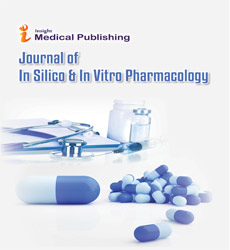Pharmacokinetics
Nitisha Goyal*
Nitisha Goyal*
Department of Biotechnology, Abdul Kalam Technical University, India- *Corresponding Author:
- Nitisha Goyal
Department of Biotechnology
Abdul Kalam Technical University
India
E-mail: nitishagoyal444@gmail.com
Received Date: January 01, 2021; Accepted Date: January 14, 2021;Published Date: January 21, 2021
Citation: Goyal N (2021) Pharmacokinetics. In Silico In Vitro Pharmacol Vol.7 No.1:1
Abstract
Pharmacokinetic difficulties have been identified as a leading source of novel chemical entity attrition in medication development. The revelation of such difficulties during clinical drug development is connected with high development costs and time investments. Drug clearance, or the elimination of medications from the body, is a fundamental topic in pharmacokinetics, similar to creatinine clearance. The clearance of a medication is rarely assessed directly in clinical practise.
Drug-Drug Interaction
Despite the fact that anticancer medications are virtually frequently given in combination with antiemetic and/or suspected modulators, little investigations have been conducted in this field. Paclitaxel with cisplatin is a well-studied combination for ovarian cancer, in which cisplatin lowers paclitaxel clearance if given first. Drug-Drug Interactions (DDIs) are one of the most common causes of medication errors in developed countries, especially among the elderly due to Polytherapy, with an incidence of 20%-40%. Polytherapy, in particular, increases the complexity of therapeutic management and, as a result, the likelihood of clinically significant DDIs, which can cause adverse drug responses or impair clinical efficacy. Pharmacokinetics and pharmacodynamics are the two main classes of DDIs.
Pharmacokinetics Drug-Drug Interaction
Pharmacokinetic interactions are frequently evaluated based on medication knowledge and are detected by monitoring the patient's clinical symptoms as well as changes in serum drug concentrations. Other molecules come into solution to reach the site of action as the free molecules engage with their molecular targets and are digested. The degree of plasma protein binding, as measured by the ratio of bound drug concentration to free drug concentration, varies widely between medications, with some attaining extremely high levels, particularly when it exceeds 0.9 mg/ml, otherwise, it is deemed low 0.2 mg/ml. Drugs having a high affinity for plasma proteins are more likely to be displaced by drugs with a lower affinity for plasma proteins. Polypharmacy has become frequent in many therapeutic areas, including the cancer patient population, therefore understanding DDIs is an important component of the medication development process, because many small molecule targeted medicines are Cytochrome P450 (CYP) inducers, inhibitors, or substrates, determining CYP-mediated DDI profiles for therapies used in the oncology setting is crucial. When two or more prescription drugs mix, it's called a drug-drug reaction. Warfarin (Coumadin), an anticoagulant (blood thinner), and fluconazole (Diflucan), an antifungal medicine, are an example of a drug interaction. If you take these two medications together, you may experience an increase in bleeding that is potentially harmful.
The study of medication concentration and rate of availability to the required receptor site is the focus of pharmacokinetics. Pharmacokinetic study normally does not stop with the original drug molecule, but also includes any discovered metabolites, whether active or inactive. Linear pharmacokinetics is a property of pharmaceuticals in which the rate of change in drug concentration is determined only by the present concentration. Regardless of how high the concentration is, the half-life will remain constant.
Open Access Journals
- Aquaculture & Veterinary Science
- Chemistry & Chemical Sciences
- Clinical Sciences
- Engineering
- General Science
- Genetics & Molecular Biology
- Health Care & Nursing
- Immunology & Microbiology
- Materials Science
- Mathematics & Physics
- Medical Sciences
- Neurology & Psychiatry
- Oncology & Cancer Science
- Pharmaceutical Sciences
